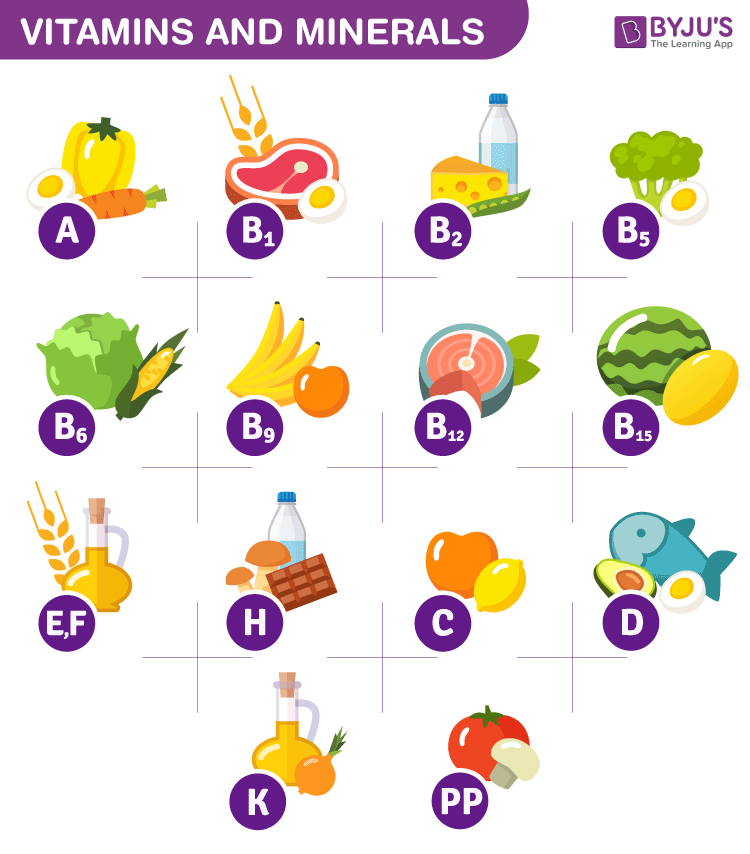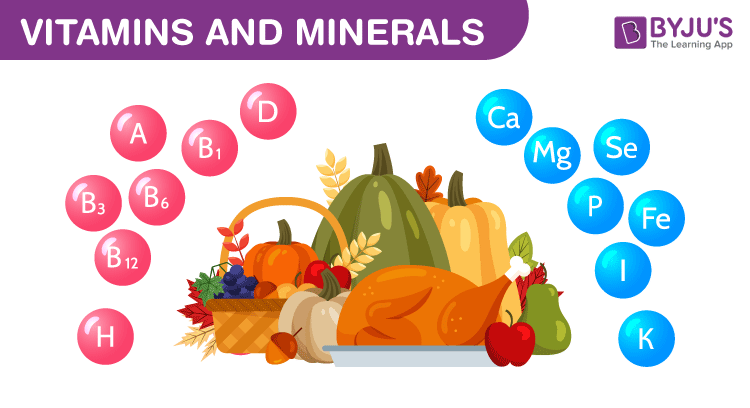Vitamins and minerals are both essential nutrients which are required in a daily diet. Altogether, there are 13 essential vitamins and many minerals which are required for the body to function properly and to maintain the optimal health. Both vitamins and minerals combine to perform hundreds of roles in the body.
Let us learn in detail about these vitamins and minerals below.
Also Read: Difference between Vitamins and Minerals
Vitamins
Vitamins are organic compounds, found in natural foods which are required for normal growth and maintenance of the body. Both humans and animals require vitamins for their growth.
The word vitamin is a combination of Latin words “vita” and “amine” which means life and nitrogen respectively. Casimir Funk discovered a substance that helps in the growth and maintenance of the body and named it in 1884.
Vitamins act as a catalyst in the generation of energy by utilizing carbohydrates and fats properly. Humans cannot live without vitamins and the human body cannot produce it on its own (except vitamin D and Vitamin B3). So it should be taken in required quantities through other sources such as the food we take, vitamin capsules etc. Vitamins can be found in major foods like meat, leafy vegetables, fruits etc.
Vitamin deficiency may cause some diseases and overdose also causes diseases.
Types of Vitamins
Vitamins are of two types:
- Fat-soluble – which are dissolved in fat
- Water-soluble – which are dissolved in water

Here is a table that illustrates the type of vitamins, sources, and diseases due to vitamin deficiency.
| Name | Solubility | Food Sources | Deficiency Diseases |
| Vitamin A | Fat | Green leafy vegetables, ripe yellow fruits, guava, milk, liver, nuts, tomatoes, oranges, carrots, broccoli, watermelon etc. | Hyperkeratosis, night blindness, and keratomalacia |
| Vitamin B1 (Thiamine) | Water | Fresh fruits, potatoes, sweet potatoes, peas, corn, cashew nuts, wheat, milk, black beans, dates etc. | Beriberi |
| Vitamin B2 (Riboflavin) | Water | Banana, dates, mushrooms, grapes, mangoes, peas, pumpkin, popcorn etc. | Slow growth, sore eyes |
| Vitamin B3 (Niacin) | Water | Meat, fish, eggs, milk products, cereals, mushroom, guava etc. | Pellagra |
| Vitamin C | Water | Fresh fruits, black currant, broccoli, goat milk and chestnuts. | Scurvy |
| Vitamin D | Fat | Fish, egg, liver, beef, cod, chicken breast etc. | Rickets and Osteomalacia |
| Vitamin E | Fat | Potatoes, pumpkin, guava, mango, milk, nuts, seeds etc. | Heart problems, Haemolysis and sterility |
| Vitamin K | Fat | Tomatoes, broccoli, chestnuts, cashew nuts, beef, lamb, mangoes, grapes etc. | Haemorrhage |
Minerals
Minerals are also organic compounds found in nature, which helps in the growth of the human body. Minerals are essential for the human body to work properly. Deficiency of minerals leads to several disorders.
List of Minerals, their sources and functions

| MINERALS | SOURCES | FUNCTIONS |
| Calcium | Blackberries, dates, milk, egg, pomegranate, almonds, wheat, soybeans etc. | Important for healthy bones, teeth and immune system |
| Sodium | Passion fruit, onions, fresh fruits, sweet potato, broccoli, pumpkin seeds, eggs, milk etc. | Helps in the regulation of blood pressure and blood volume. It also helps in the proper functioning of nerves and muscles |
| Iodine | Sea foods, iodised salt, milk and foods that are grown in iodine-rich places | Promotes healthy hair, nails, skin and teeth. Also controls body weight and growth |
| Phosphorous | Passion fruit, pomegranate, dates, beef, tuna, oats etc. | Phosphorous along with calcium is necessary for the formation of bones, teeth etc. |
For more information about Vitamins, Minerals and sources of nutrition, visit BYJU’S.

its super and thank you
right and must have experienced live chat with the experienced teacher of Byjus
it was cool
liked it specially the live chat was better more info in it
i feel lucky
i love byjus
thanks
So helpful teachers
so interesting app
I feel very lucky
I LIKE BYJUS